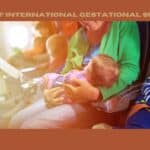Winners
The European Parliament – In their annual report the European Parliament condemned all forms of surrogacy, stating that surrogacy “undermines the human dignity of the woman since her body and its reproductive functions are used as a commodity.” European leaders are right in saying that this is an urgent human rights matter. Gestational surrogacy is reproductive exploitation, especially of vulnerable women in developing countries.
 Paul Kalanithi – Neurosurgeon, writer, and Paul Ramsey Institute Alum, Paul Kalanithi died at the age of 37. His 2014 New York Times essay, “How Long Have I Got Left?”, was brutally honest, and was read and shared by people all around the world. His book When Breath Becomes Air, written literally in his last months of life, has just been released. It is already receiving high praise, and his wife has just written a thoughtful and moving essay for the New York Times on Paul’s life and on guiding his book through the publication process in the months following his death. Though we grieve the loss of Paul, his life continues to touch many.
Paul Kalanithi – Neurosurgeon, writer, and Paul Ramsey Institute Alum, Paul Kalanithi died at the age of 37. His 2014 New York Times essay, “How Long Have I Got Left?”, was brutally honest, and was read and shared by people all around the world. His book When Breath Becomes Air, written literally in his last months of life, has just been released. It is already receiving high praise, and his wife has just written a thoughtful and moving essay for the New York Times on Paul’s life and on guiding his book through the publication process in the months following his death. Though we grieve the loss of Paul, his life continues to touch many.
Cambodia, India, Mexico, and Thailand – Because surrogacy brokers prey on low-income and poor women, the governments of these countries are able to see the exploitation of women and children up close and personal. Each of these countries made important changes in their laws this year, restricting the practice of surrogacy by closing their doors to foreign and same-sex couples who seek lower cost surrogacy in order to buy a baby.
Malta – Big things can come from small countries. Helen D’Amato, the Commissioner for Children, said that egg and sperm donation should not be permitted, that Malta’s policy of only fertilizing no more than two eggs at one time should remain in force, and that surrogacy should not be permitted.
Brittneyrose Torres and  Melissa Cook – These women are gestational surrogates, each carrying triplets, who were told by the intended parents to “reduce” their pregnancies down to twins because the intended parents do not want triplets. Both women reached out to us at the Center for Bioethics and Culture Network (CBC) when they realized they had no legal representation for their interests who would support their desire not to abort the babies. Their stories show why we at the CBC oppose all surrogacy—women are exploited and children are treated as products.
Melissa Cook – These women are gestational surrogates, each carrying triplets, who were told by the intended parents to “reduce” their pregnancies down to twins because the intended parents do not want triplets. Both women reached out to us at the Center for Bioethics and Culture Network (CBC) when they realized they had no legal representation for their interests who would support their desire not to abort the babies. Their stories show why we at the CBC oppose all surrogacy—women are exploited and children are treated as products.
Baby Gammy – Born with his twin to a surrogate mother in Thailand, but left behind by his Australian intended parents because he has Down Syndrome, Baby Gammy turned one in 2015! Generous donations have been given to provide for his long-term care, and he’s thriving in Cambodia with his birth mother.
Losers
The Maynard Family – Brittany Maynard moved from California to Oregon after being diagnosed with terminal brain cancer. Her move was provoked by her desire to access a “right-to-die” in Oregon, where physician assisted suicide is, sadly, legal. Her family has become the face for passing similar legislation in more states (as California did in 2015—see below). In addition, Brittany’s husband, Dan Diaz, is fighting the wrong battle. We’ve said before and will say it again: there is no right-to-die.
Britain – The first country to approve the risky three-parent embryo technology with a vote in the House of Lords of 280 to 48, and 382 to 128 in the House of Commons. Touted as a means of preventing genetic diseases passed on by the mother through her mitochondria, the technology allows changes to be made not only in the person who would receive the defect, but will also forever alter the DNA of future progeny. A host of safety and ethical concerns remain, but they are being ignored due to a mistaken assumption that all scientific progress is good and must advance unhindered.
 Gov. Jerry Brown – Empirical research continues to demonstrate that physician assisted suicide increases overall suicide rates in states where the practice is legal. Gov. Brown ignored this growing body of evidence along with testimony from physicians, nurses, and disability rights activists, and signed into law a bill that legalizes physician assisted suicide in California, making it the fifth state in the U.S. where the practice is legal.
Gov. Jerry Brown – Empirical research continues to demonstrate that physician assisted suicide increases overall suicide rates in states where the practice is legal. Gov. Brown ignored this growing body of evidence along with testimony from physicians, nurses, and disability rights activists, and signed into law a bill that legalizes physician assisted suicide in California, making it the fifth state in the U.S. where the practice is legal.
Germany – Germany’s Parliament, the Bundestag, passed legislation allowing the regulation of assisted suicide in their country. Reports say the taboo in Germany of talking about dying is now lifted. Indeed, talking about dying is a good thing. But allowing physicians to aid in the intentional death of their patients is wrong. Germany needs to revisit its history of abuses of the vulnerable, who will be at great risk under this new legislation.
Ontario, Canada – Government funded in vitro fertilization (IVF) treatments will now be offered at over 50 clinics in Ontario. For those who are eligible, the government will pay for one IVF cycle. Those eligible include patients with medical issues causing infertility as well as “patients” with non-medical forms of infertility such as being single or being a same-sex couple. At the very least, given that most IVF cycles fail, wouldn’t funding other medical treatments make better sense for the use of government funds?
 The Netherlands – The Dutch just can’t seem to get enough physician assisted suicide in their country. The Dutch Voluntary Euthanasia Society has doubled their efforts to get an end-of-life pill on the market that would be free and available to anyone 70 or older. It is reported that some 14,000 people in the Netherlands were aided to their deaths last year.
The Netherlands – The Dutch just can’t seem to get enough physician assisted suicide in their country. The Dutch Voluntary Euthanasia Society has doubled their efforts to get an end-of-life pill on the market that would be free and available to anyone 70 or older. It is reported that some 14,000 people in the Netherlands were aided to their deaths last year.
Author Profile

- Jennifer Lahl, MA, BSN, RN, is founder and president of The Center for Bioethics and Culture Network. Lahl couples her 25 years of experience as a pediatric critical care nurse, a hospital administrator, and a senior-level nursing manager with a deep passion to speak for those who have no voice. Lahl’s writings have appeared in various publications including Cambridge University Press, the San Francisco Chronicle, the Dallas Morning News, and the American Journal of Bioethics. As a field expert, she is routinely interviewed on radio and television including ABC, CBS, PBS, and NPR. She is also called upon to speak alongside lawmakers and members of the scientific community, even being invited to speak to members of the European Parliament in Brussels to address issues of egg trafficking; she has three times addressed the United Nations during the Commission on the Status of Women on egg and womb trafficking.
Latest entries
 infertilityApril 23, 2024The Rise of International Gestational Surrogacy in the U.S.
infertilityApril 23, 2024The Rise of International Gestational Surrogacy in the U.S. Assisted Reproductive TechnologyApril 16, 2024Founder Jennifer Lahl’s Speech on Surrogacy to the Casablanca Declaration
Assisted Reproductive TechnologyApril 16, 2024Founder Jennifer Lahl’s Speech on Surrogacy to the Casablanca Declaration #BigFertilityFebruary 27, 2024No, Alabama Didn’t Ban IVF
#BigFertilityFebruary 27, 2024No, Alabama Didn’t Ban IVF ArticleSeptember 25, 2023The Little Engine That Could
ArticleSeptember 25, 2023The Little Engine That Could

